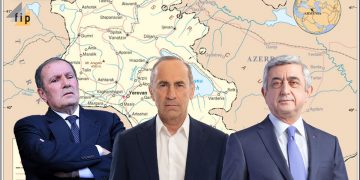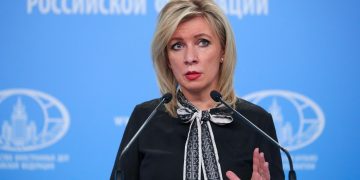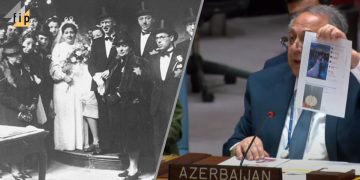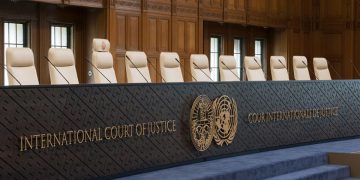Since December 12, persons affiliated with the government of Azerbaijan and posing as “eco-activists” have blocked the Goris-Stepanakert road, as a result of which the population of Nagorno Karabakh has appeared in a blockade. There is already a shortage of food and medical supplies there.
Upon Armenia’s official request, a meeting of the UN Security Council was convened on the issue on December 20, during which the the Permanent Representative of Azerbaijan to the UN Yashar Aliyev and the Deputy Permanent Representative of the Russian Federation to the UN Anna Evstigneeva came up with a number of false and manipulative claims.
The Fact Investigation Platform decided to refer to some of them.
The representative of the Russian Federation is lying: Traffic in the Corridor has not even been partially restored
At the same meeting of the Security Council, the Deputy Permanent Representative of the Russian Federation, Anna Evstigneeva, announced that thanks to the efforts of the Russian side, traffic in the Lachin Corridor was “partially restored”.
Since December 12, there are only two known cases of vehicle traffic through the Corridor in open sources.
On December 18, the 7th day of the blockade of the Lachin Corridor, a video appeared on the Internet showing a convoy of Russian peacekeepers carrying humanitarian goods passing through the Lachin Corridor. The video was actively circulated in Azerbaijani social networks and mass media.
The next and last case of traffic of vehicles through the Corridor was recorded in open sources on December 19, when one of the critically ill patients of Stepanakert Republican Hospital was transported to Yerevan by ambulance accompanied by the Red Cross.
No other vehicles are known to have traveled through the Corridor since it was blocked.
The official Stepanakert also announces on a daily basis that the traffic in the Corridor has not been restored, and Nagorno Karabakh remains under complete blockade. According to the NK information headquarters, as of December 21, the situation remains the same.
Thus, the claim of the Deputy Representative of the Russian Federation to the UN that the traffic in the Lachin Corridor has been partially restored is a lie.
The Lachin Corridor is closed
The representative of Azerbaijan stated that neither the government of Azerbaijan nor the “protesting activists” have blocked the Lachin road, and the movement of citizens, goods and vehicles continues unimpeded.
“Videos shared on social media show the unimpeded passage of various types of vehicles, including ambulances and humanitarian convoys … The claims regarding alleged about the humanitarian consequences of the situation are equally false. …There is no impediment whatsoever as to the supply of goods for the use of local residents or in terms of delivery of essential medical services,” Yashar Aliyev said.
According to Patagraph 6 of the statement of November 9, Lachin region came under the control of the Republic of Azerbaijan. However, the 5 km wide Lachin Corridor would remain under the control of the Russian peacekeeping troops, which should ensure the communication between Nagorno Karabakh and Armenia.
According to the same paragraph, the Republic of Azerbaijan shall guarantee safe movement of citizens, vehicles and cargo in both directions along the Lachin corridor.
However, the road is closed for the residents of Armenia and Nagorno-Karabakh as of the time of publication of this article. As mentioned above, after the Corridor was blocked, only the vehicles of the Russian peacekeeping troops travel on that road. There was only one exception on December 19, when one of the patients in Stepanakert hospital, who was in a critical condition, was transported to Yerevan accompanied by the Red Cross.
The road remains closed due to the actions of Azerbaijani “eco-activists”, and the claim of the representative of Azerbaijan that the transportation of citizens, vehicles and food supplies is carried out without any restrictions is a lie. Apart from the transport of the patient in critical condition mentioned above, no other movement of citizens, vehicles or food supplies has taken place.
It is noteworthy that the actions of the Azerbaijanis blocking the road are actively covered by the Azerbaijani media, meaning that the Azerbaijani media are always present in the blocked road section. Therefore, the assertion of the representative of Azerbaijan that the Azerbaijanis who blocked the road do not in any way hinder the free movement of citizens, vehicles or cargo, would also have a video justification to prove it. As for the videos mentioned by Yashar Aliyev, here too he resorts to manipulation, presenting the videos of a patient transported by the Red Cross and the vehicles of Russian peacekeepers as a continuous flow of ambulances and convoys with humanitarian cargo.
UN Security Council resolutions
The representative of Azerbaijan also referred to the resolutions adopted by the UN Security Council during military operations in the NK conflict zone in the 1990s.
“It should be noted that what Armenia and some council members erroneously called Nagorno-Karabakh is the internationally recognized sovereign territory of Azerbaijan, which was under unlawful Armenian occupation for nearly 30 years. And I underline – for nearly 30 years. This was consistently confirmed by Security Council resolutions 822, 853, 874, 884,” he noted.
FIP.am has referred several times to those UN resolutions, which are repeatedly speculated on and manipulated by Azerbaijan. There is no statement or claim regarding the former NKAO. Resolutions 822, 853, 874, 884 urge the “local Armenian forces” to withdraw the troops from Kelbajar, Aghdam, Zangelan regions and the city of Horadiz, adjacent to NKAO. Note that after the war in 2020 those regions came under the control of Azerbaijan, that is, the claims of the Azerbaijani official are not relevant in the context of the meeting of the UN Security Council on December 20.
It is also noteworthy that those resolutions did not in any way blame Armenia for the occupation of the territories. In these resolutions, the UN called on the government of the Republic of Armenia to continue exerting its influence on the Armenians of the Nagorno-Karabakh region of Azerbaijan, so that the latter would follow the demands of the resolutions.
Therefore, the claim that the Nagorno-Karabakh region is under “Armenian occupation” is manipulative.
You can find more details about the resolutions of the UN Security Council in this article by FIP.am.
The population of Lachin before the first Nagorno Karabakh war
The representative of Azerbaijan to the UN also referred to the population of Lachin region before the first war in Nagorno-Karabakh in the 1990s.
“More than 77,000 residents of Lachin were forced to leave their homes and property [in the 1990s],” he said.
In reality, Lachin region did not have that much population before the war. According to official data, in 1989 there were 47,339 people living in Lachin region.
Therefore, this claim by Yashar Aliyev is also false.
Transportation of minerals through the Lachin Corridor
In another claim, the representative of Azerbaijan stated that the transfer of natural resources through the Lachin Corridor is a significant violation of the trilateral statement.
“Under the trilateral statement, the Lachin road is envisaged to be used exclusively for humanitarian purposes. The abuse of the road […] for the purpose of illegal trafficking of natural resources of Azerbaijan constitutes a material breach of the trilateral statement and cannot be tolerated,” he stated.
This claim of the representative of Azerbaijan is also groundless. Only Paragraph 6 of the trilateral statement refers to the conditions of use of the Lachin Corridor.
According to the paragraph, the Republic of Azerbaijan shall guarantee safe movement of citizens, vehicles and cargo in both directions along the Lachin corridor. There is no mention in the document about the ban on minerals, in particular their transportation.
This makes it evident that the assertion of the representative of Azerbaijan that minerals cannot be transported through the Lachin Corridor is groundless. According to the trilateral statement of November 9, there is no restriction on cargo transported through the Lachin Corridor.
UN cornerstones
At the beginning of the speech, the representative of Azerbaijan to the UN made accusations against the Security Council. “This organization was established as the guardian of the United Nations Charter and international law. Respect for the sovereignty and territorial integrity of states and non-interference in their domestic affairs are the cornerstones in this regard,” he said.
Indeed, the first chapter of the UN Charter states that its provisions do not authorize the United Nations to intervene in matters which are essentially within the domestic jurisdiction of any State, or require members to submit such matters to settlement under the Charter. At the same time, it is emphasized that this principle should not prejudice the application of enforcement measures under Chapter 7. And in chapter 7, under the heading “Action with respect to threats to the peace, breaches of the peace and acts of aggression”, it is stated that “The Security Council shall determine the existence of any threat to the peace, breach of the peace or act of aggression and shall make recommendations or decide what measures shall be taken to maintain or restore international peace and security. Thus, the UN Security Council may require the interested parties to implement such temporary measures as it deems necessary or desirable.
First, the issue of Nagorno-Karabakh, particularly the Lachin Corridor, cannot be considered a domestic affair, as the conflict has been recognized as an international conflict by a number of states and reputable international institutions since the 1990s. The peace in the conflict zone has been breached repeatedly in the 1990s, during the April War of 2016 and the 44-day war of 2020. Besides, according to the trilateral statement of November 9, the peacekeeping troops of a third country, Russia, are stationed there in order to ensure normal life in the regio.
Hence, the claim of the representative of Azerbaijan that the Nagorno Karabakh issue is a “domestic affair” of Azerbaijan is a lie and manipulation.
Nane Manasyan
Sevada Ghazaryan
Loosineh Voskanyan

 FACTOMETER
FACTOMETER









